Related Research Articles
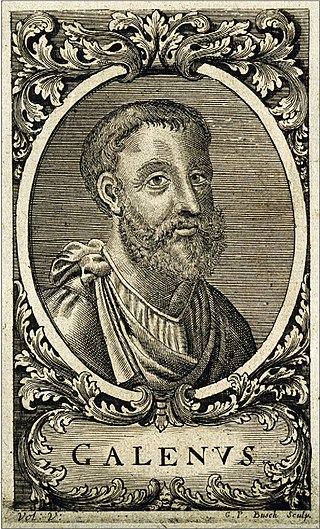
Aelius Galenus or Claudius Galenus, often anglicized as Galen or Galen of Pergamon, was a Roman Greek physician, surgeon and philosopher. Considered to be one of the most accomplished of all medical researchers of antiquity, Galen influenced the development of various scientific disciplines, including anatomy, physiology, pathology, pharmacology, and neurology, as well as philosophy and logic.
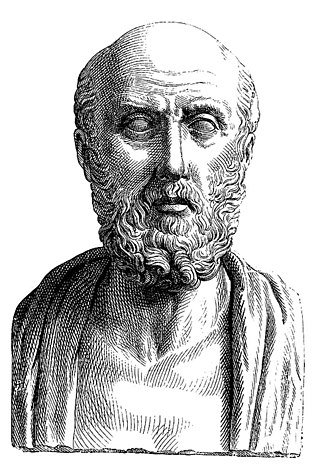
Hippocrates of Kos, also known as Hippocrates II, was a Greek physician of the classical period who is considered one of the most outstanding figures in the history of medicine. He is traditionally referred to as the "Father of Medicine" in recognition of his lasting contributions to the field, such as the use of prognosis and clinical observation, the systematic categorization of diseases, or the formulation of humoral theory. The Hippocratic school of medicine revolutionized ancient Greek medicine, establishing it as a discipline distinct from other fields with which it had traditionally been associated, thus establishing medicine as a profession.

Bloodletting is the withdrawal of blood from a patient to prevent or cure illness and disease. Bloodletting, whether by a physician or by leeches, was based on an ancient system of medicine in which blood and other bodily fluids were regarded as "humours" that had to remain in proper balance to maintain health. It is claimed to have been the most common medical practice performed by surgeons from antiquity until the late 19th century, a span of over 2,000 years. In Europe, the practice continued to be relatively common until the end of the 19th century. The practice has now been abandoned by modern-style medicine for all except a few very specific medical conditions. In the overwhelming majority of cases, the historical use of bloodletting was harmful to patients.
Polybus was one of the pupils of Hippocrates, and also his son-in-law. He lived on the island of Cos in the 4th century BC. With his brothers-in-law, Thessalus and Draco, he was one of the founders of the Dogmatic school of medicine. He was sent by Hippocrates, with his fellow-pupils, during the time of the plague, to assist different cities with his medical skill. Afterwards, he remained in his native country. According to Galen, he followed implicitly the opinions and practices of Hippocrates, but the strict accuracy of this assertion has been doubted.

The four temperament theory is a proto-psychological theory which suggests that there are four fundamental personality types: sanguine, choleric, melancholic, and phlegmatic. Most formulations include the possibility of mixtures among the types where an individual's personality types overlap and they share two or more temperaments. Greek physician Hippocrates described the four temperaments as part of the ancient medical concept of humourism, that four bodily fluids affect human personality traits and behaviours. Modern medical science does not define a fixed relationship between internal secretions and personality, although some psychological personality type systems use categories similar to the Greek temperaments.
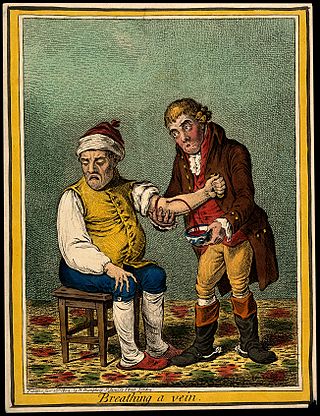
Heroic medicine, also referred to as heroic depletion theory, was a therapeutic method advocating for rigorous treatment of bloodletting, purging, and sweating to shock the body back to health after an illness caused by a humoral imbalance. Rising to the front of orthodox medical practice in the "Age of Heroic Medicine" (1780–1850), it fell out of favor in the mid-19th century as gentler treatments were shown to be more effective and the idea of palliative treatment began to develop.
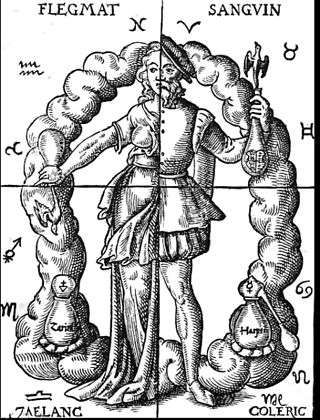
Humorism, the humoral theory, or humoralism, was a system of medicine detailing a supposed makeup and workings of the human body, adopted by Ancient Greek and Roman physicians and philosophers.

In the Middle Ages, the medicine of Western Europe was composed of a mixture of existing ideas from antiquity. In the Early Middle Ages, following the fall of the Western Roman Empire, standard medical knowledge was based chiefly upon surviving Greek and Roman texts, preserved in monasteries and elsewhere. Medieval medicine is widely misunderstood, thought of as a uniform attitude composed of placing hopes in the church and God to heal all sicknesses, while sickness itself exists as a product of destiny, sin, and astral influences as physical causes. On the other hand, medieval medicine, especially in the second half of the medieval period, became a formal body of theoretical knowledge and was institutionalized in the universities. Medieval medicine attributed illnesses, and disease, not to sinful behaviour, but to natural causes, and sin was connected to illness only in a more general sense of the view that disease manifested in humanity as a result of its fallen state from God. Medieval medicine also recognized that illnesses spread from person to person, that certain lifestyles may cause ill health, and some people have a greater predisposition towards bad health than others.

The Hippocratic Corpus, or Hippocratic Collection, is a collection of around 60 early Ancient Greek medical works strongly associated with the physician Hippocrates and his teachings. The Hippocratic Corpus covers many diverse aspects of medicine, from Hippocrates' medical theories to what he devised to be ethical means of medical practice, to addressing various illnesses. Even though it is considered a singular corpus that represents Hippocratic medicine, they vary in content, age, style, methods, and views practiced; therefore, authorship is largely unknown. Hippocrates began Western society's development of medicine, through a delicate blending of the art of healing and scientific observations. What Hippocrates was sharing from within his collection of works was not only how to identify symptoms of disease and proper diagnostic practices, but more essentially, he was alluding to his personable form of art, "The art of true living and the art of fine medicine combined." The Hippocratic Corpus became the foundation upon which Western medical practice was built.
In medicine, both ancient and modern, a dyscrasia is any of various disorders. The word has ancient Greek roots meaning "bad mixture". The concept of dyscrasia was developed by the Greek physician Galen, who elaborated a model of health and disease as a structure of elements, qualities, humors, organs, and temperaments. Health was understood in this perspective to be a condition of harmony or balance among these basic components, called eucrasia. Disease was interpreted as the disproportion of bodily fluids or four humours: phlegm, blood, yellow bile, and black bile. The imbalance was called dyscrasia. In modern medicine, the term is still occasionally used in medical context for an unspecified disorder of the blood, such as a plasma cell dyscrasia.

The treatise On Ancient Medicine is perhaps the most intriguing and compelling work of the Hippocratic Corpus. The Corpus itself is a collection of about sixty writings covering all areas of medical thought and practice. Traditionally associated with Hippocrates, the father of Western medicine, philological evidence now suggests that it was written over a period of several centuries and stylistically seems to indicate that it was the product of many authors dating from about 450–400 B.C.
Praxagoras was a figure of medicine in ancient Greece. He was born on the Greek island of Kos in about 340 BC. Both his father, Nicarchus, and his grandfather were physicians. Very little is known of Praxagoras' personal life, and none of his writings have survived.

Byzantine medicine encompasses the common medical practices of the Byzantine Empire from c. 400 AD to 1453 AD. Byzantine medicine was notable for building upon the knowledge base developed by its Greco-Roman predecessors. In preserving medical practices from antiquity, Byzantine medicine influenced Islamic medicine and fostered the Western rebirth of medicine during the Renaissance.
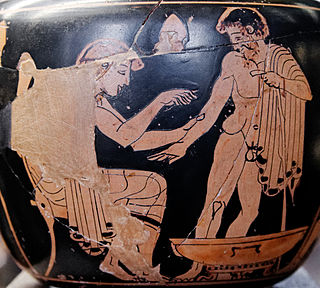
Ancient Greek medicine was a compilation of theories and practices that were constantly expanding through new ideologies and trials. The Greek term for medicine was iatrikē. Many components were considered in ancient Greek medicine, intertwining the spiritual with the physical. Specifically, the ancient Greeks believed health was affected by the humors, geographic location, social class, diet, trauma, beliefs, and mindset. Early on the ancient Greeks believed that illnesses were "divine punishments" and that healing was a "gift from the Gods". As trials continued wherein theories were tested against symptoms and results, the pure spiritual beliefs regarding "punishments" and "gifts" were replaced with a foundation based in the physical, i.e., cause and effect.

Medicine in ancient Rome was highly influenced by ancient Greek medicine, but also developed new practices through knowledge of the Hippocratic Corpus combined with use of the treatment of diet, regimen, along with surgical procedures. This was most notably seen through the works of two of the prominent Greek physicians, Dioscorides and Galen, who practiced medicine and recorded their discoveries. This is contrary to two other physicians like Soranus of Ephesus and Asclepiades of Bithynia, who practiced medicine both in outside territories and in ancient Roman territory, subsequently. Dioscorides was a Roman army physician, Soranus was a representative for the Methodic school of medicine, Galen performed public demonstrations, and Asclepiades was a leading Roman physician. These four physicians all had knowledge of medicine, ailments, and treatments that were healing, long lasting and influential to human history.
The Galenic corpus is the collection of writings of Galen, a prominent Greek physician, surgeon and philosopher in the Roman Empire during the second century CE. Several of the works were written between 165–175 CE.
The history of medical diagnosis began in earnest from the days of Imhotep in ancient Egypt and Hippocrates in ancient Greece but is far from perfect despite the enormous bounty of information made available by medical research including the sequencing of the human genome. The practice of diagnosis continues to be dominated by theories set down in the early 20th century.

On the Sacred Disease is a work of the Hippocratic Corpus, written about 400 B.C. Its authorship cannot be confirmed, so is regarded as dubious. The treatise is thought to contain one of the first recorded observations of epilepsy in humans. The author explains these phenomena by the flux of the phlegm flowing from the brain into the veins rather than assigning them a divine origin. This turn from a supernatural to a naturalistic explanation is considered a major breakthrough in the history of medicine.
Modern understanding of disease is very different from the way it was understood in ancient Greece and Rome. The way modern physicians approach healing of the sick differs greatly from the methods used by early general healers or elite physicians like Hippocrates or Galen. In modern medicine, the understanding of disease stems from the "germ theory of disease", a concept that emerged in the second half of the 19th century, such that a disease is the result of an invasion of a micro-organism into a living host. Therefore, when a person becomes ill, modern treatments "target" the specific pathogen or bacterium in order to "beat" or "kill" the disease.
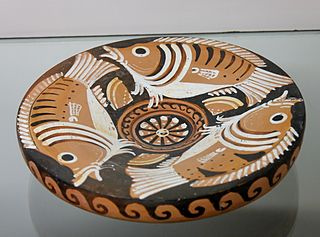
Classical antiquity is the period of cultural history spanning from the 8th century BC to the beginning of the Middle Ages. The major civilizations are those of the Mediterranean region, ancient Greece, ancient Rome, and southwest Asia. Nutrition consisted of simple fresh or preserved whole foods that were either locally grown or transported from neighboring areas during times of crisis. Physicians and philosophers studied the effect of food on the human body and they generally agreed that food was important in preventing illness and restoring health.
References
- Lindberg, David C. (2007). The Beginnings of Western Science. Chicago: The University of Chicago Press.
- Hippocrates. Heracleitus On the Universe Vol. IV. Translated by Jones, W.H.S. New York: G.P Putnam's Sons.
- Gillispie, Charles Coulston (1972). Dictionary of Scientific Biography. Vol. VI. New York: Charles Scribner's Sons. pp. 419–427.
- Jouanna, Jacques; Allies, Neil (2012), van der Eijk, Philip (ed.), "THE LEGACY OF THE HIPPOCRATIC TREATISE THE NATURE OF MAN: THE THEORY OF THE FOUR HUMOURS", Greek Medicine from Hippocrates to Galen, Selected Papers, Brill, pp. 335–360.